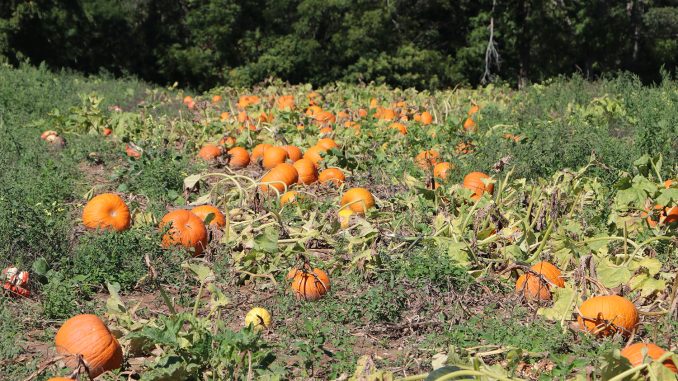
As the summer cools into autumn, many North Fork farmers are left looking back on a season hotter and drier than expected that, with supply chain issues, drove higher production costs.
Farmers interviewed by The Suffolk Times said their crops didn’t suffer for the most part, but their wallets did, pointing to higher costs for diesel, irrigation and fertilizer throughout a summer that included a two-month water emergency.
“For the drought, the biggest issue is the amount of irrigating we had to do, and also with the high price of diesel fuel and everything, big expense this year,” said Erick Lewin of Lewin Farms in Calverton.
Some pumpkin varieties didn’t grow as much fruit this year, but there’s enough to get through the season, Mr. Lewin said, who noted the biggest issue remained the amount of watering needed on the farm.
Sujecki Farms and Nurseries has raised prices 15% to accommodate extra costs, said farmer Jonathan Sujecki, who highlighted the high cost of fuel and irrigation this past summer. “All in all, everything suffered,” he said.
Tom Wickham of Wickham’s Fruit Farm said: “We are lucky here to be fully irrigated. Without irrigation, there will be no farms here. With climate change this will become more critical. Any restrictions on the use of irrigation will hurt the farming industry.”
The high heat and drought conditions driving costs have been coined “heatflation,” as farmers feel the impact of climate change. Those conditions this summer created a lot of extra work for farmers, said Sandra Menasha, a vegetable and potato specialist at Cornell Cooperative Extension of Suffolk County.
“Farmers need to be irrigating 24/7 under those conditions just to kind of keep the crop quality where they need it and to get a harvest from it,” she said. “It’s a lot of extra burden and work on the growers.”
Farmers have been dealing with the financial burden of the drought and high heat in addition to increased costs for fertilizer and other inputs, she said, plus the soaring temperatures hurt pollen viability and bee activity, leading flowering crops like pumpkins and winter squash to suffer as a result.
Blackberries suffered in particular, Ms. Menasha added. Bushes “flowering during the high heat did not get pollinated at all, and there was a whole slew of blackberry bushes that no blackberries formed or the blackberries that did form were really malformed because of incomplete pollination, and those fruits become unmarketable.”
“So there were some significant losses in some berry crops and probably some other crops too where farmers may not be able to irrigate. Or even if they do, just the timing of when something was pollinating or flowering during the high heat, they couldn’t mitigate that and lost a lot,” she said.
But it’s not all bad news, she added. Without rainy periods, disease pressure was very low this summer, “so farmers didn’t lose a lot to typical diseases that they would see from wetter conditions … so their yields and their crop quality, if they kept up with irrigation, were much better than in a wetter year or wetter season.”
Wineries in particular fared very well in the heat. The summer drought was “excellent” for vineyards, said Kareem Massoud, president of Long Island Wine Country and winemaker at Paumanok Vineyards.
“The vines love sunny, dry, breezy, hot weather, and that basically describes what we had this summer, so it was really close to ideal conditions,” he said.
Rich Olsen-Harbich, winemaker at Bedell Cellars in Cutchogue, said the vineyard had a “beautiful” season, and the summer drought resulted in what he described as his earliest harvest ever.
“I’ve rarely been done with whites by the end of September, which we were this year and we even got into malbec in September, which I had never done,” he said, noting the harvest will likely wrap before the end of October.
Ms. Menasha said climate experts have indicated that, as temperatures warm, growers can continue to expect a longer or shift in season, higher temperatures, more drought conditions and short periods of very heavy rainfall.
On Long Island, farmers have already started to practice climate resiliency tactics such as cover cropping, reducing tillage and building organic matter, she said.
If water remains plentiful, Long Island farmers may even benefit from the warmer temperatures, she added, with an extended growing season and opportunity to grow more tropical crops.
But even still, this past summer was financially tough for many farmers. “It was a trying year for them. But I think all of that paid off because they do have a good crop as a result,” Ms. Menasha said.
WITH TARA SMITH AND STEVE WICK

